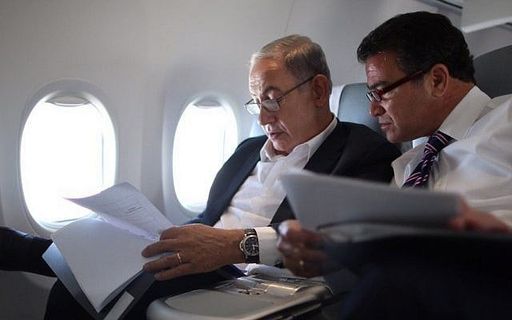A widely-publicised spat between Prime Minister Benjamin Netanyahu and his top military official has exposed the deep divisions within Israel’s political leadership and security apparatus over the protracted war on the Palestinian enclave.
Netanyahu, facing an arrest warrant by a global court for suspected war crimes in Gaza, this week shut down any potential discussion over a partial hostage deal despite mounting pressure from hostage families and military leadership.
A six-hour-long meeting of the Israeli war cabinet that extended into the wee hours of Monday revealed deep divisions within Israel’s leadership over the ongoing war in Gaza and the fate of Israeli hostages.
In spite of the urgency of the hostage crisis, Netanyahu allowed no discussion of a potential deal. National Security Minister Itamar Ben-Gvir pushed for a vote on a resolution explicitly rejecting a partial deal. But Netanyahu went one step further. “There’s no need for a vote. It’s not on the agenda, and we must focus on dismantling Hamas,” he was quoted as saying.
Instead, the security cabinet’s agenda was dominated by military strategy, with the Israeli army presenting plans for a full-scale operation to take over Gaza City.
After five swaps of Israeli hostages for Palestinian prisoners, Israel estimates that 48 hostages remain in Gaza. Twenty of them are believed to be alive.
The outright refusal by Netanyahu to even discuss a potential hostage deal followed Israeli military’s Chief of Staff Lieutenant General Eyal Zamir’s forceful support for a negotiated return of hostages.
“There is a framework on the table, and we need to take it,” Zamir said, while nudging the cabinet towards a hostage deal.
More importantly, the general warned that the proposed takeover of Gaza City would bog down the Israeli military in Gaza for an extended period of time, leaving it in charge of a “full-fledged occupation” of the war-ravaged enclave.
“You are heading to a military government. Your plan is leading us there. Understand the implications,” Zamir was quoted as saying.
Netanyahu’s refusal to negotiate a hostage swap deal with Hamas once again raised questions about his priorities, as a growing number of protestors demand a deal to secure the hostages’ release.
Palestinian writer and political analyst Kamel Hawwash tells TRT World that Netanyahu “feels completely emboldened” because US President Donald Trump has allegedly told him to “finish the job”.
Netanyahu himself referred to Trump’s advice during the cabinet meeting. “Forget the partial deals. Go in with full force. Finish it,” he said, while quoting the US president.
The supposed encouragement by Trump aligns with Netanyahu’s broader vision that Hawwash says extends beyond Gaza.
“Netanyahu is more interested in reoccupying Gaza, in expelling the Palestinians, and then continuing to chase the objective of a greater Israel,” he says.
“So it’s not just about Gaza. It’s about Gaza, the (occupied) West Bank, and then possibly other countries around Israel,” he says.

Divergent military view
Kadir Temiz, president of the Ankara-based Centre for Middle Eastern Studies, tells TRT World that Netanyahu’s refusal to engage with a phased hostage deal appears to be driven by a combination of strategic, political, and ideological factors.
“While Israel wants a complete release of the hostages, Hamas wants a partial release due to Israel’s ongoing occupation in Gaza,” Temiz says.
Other unresolved issues include Gaza’s administrative future, third-party involvement in negotiations, and Hamas’s push for reconstruction and lifting the blockade, which Israel resists without guarantees that materials won’t be used for military purposes, he says.
The divergence between Netanyahu and the military leadership highlights the growing civil-military rift. Hawwash says that Israel’s military and government have frequently been at odds, with Netanyahu having previously replaced military personnel to align the army more closely with his views.
But Zamir, whom Netanyahu supported for the role, has expressed scepticism about the military strategy. “Having seen exactly where the army is in Gaza, (Zamir) doesn’t believe this is going to lead to the release of the hostages,” Hawwash says.
On the contrary, the Israeli army’s continuous engagement in Gaza is further endangering the lives of the hostages, he adds.
Operation Gideon’s Chariots, a military offensive that Tel Aviv launched in May to “conquer” Gaza and get all hostages released, came to an unceremonious close last month without fulfilling its objectives.
Hamas has warned that the planned Gaza City offensive would subject Israeli hostages in the area to the "same risks" as those faced by the group’s fighters.

Netanyahu: Unmoved by protests
Under the proposed deal, Hamas would have released 10 hostages along with the bodies of 18 slain captives over two months. During the same 60-day period, stakeholders would finalise the terms for the release of the remaining hostages along with a permanent end to Israel’s war, which has killed almost 64,000 Palestinians, mostly women and children, in nearly two years.
Netanyahu’s apparent indifference to widespread protests demanding a hostage deal has raised questions about his motivations.
Temiz attributes this to Netanyahu’s survival instinct. “This is directly related to Netanyahu’s own political career, which has been going in the wrong direction for years. Any backlash and weakness would cause serious consequences for him,” he says.
By prioritising a military solution and maintaining a hard-line stance, Netanyahu aims to preserve his coalition and prolong his political relevance, even at the cost of public discontent, he says.
“Netanyahu’s reluctance to make a hostage deal is not about a lack of empathy or awareness, but rather a strategic and political calculus,” Temiz says.
The exclusion of Major-General Nitzan Alon, head of the Israeli military’s Hostages Directorate, from the cabinet meeting further demonstrated Netanyahu’s reluctance to prioritise the hostage issue.
The decision to not invite Alon to the cabinet meeting drew sharp criticism from the Hostages and Missing Families Forum, which accused Netanyahu’s government of “torpedoing a deal for an end to the war, in opposition to the people’s will”.
Hawwash says partial deals in the past have been successful, with ceasefires enabling hostage and prisoner releases, allowing aid into Gaza, and reducing casualties on both sides.
“But Netanyahu’s assessment is that there isn't really much to do in Gaza, except completely destroy the rest of it,” he says.



















